Bamboo Kitchen Utensils: Eco-Friendly, Stylish, and Sustainable
Nowadays, as sustainability gains more and more importance, it’s critical to identify environmentally suitable substitutes for commonplace things. Bamboo kitchenware has become a well-liked option for people looking for options that are eco-friendly, long-lasting, and fashionable. Bamboo kitchen implements, which range from spatulas to serving spoons, are an essential component of any contemporary kitchen due to their numerous advantages. Let’s examine in more detail why bamboo kitchen tools are the ideal option for your cooking requirements.
Table of Contents
Toggle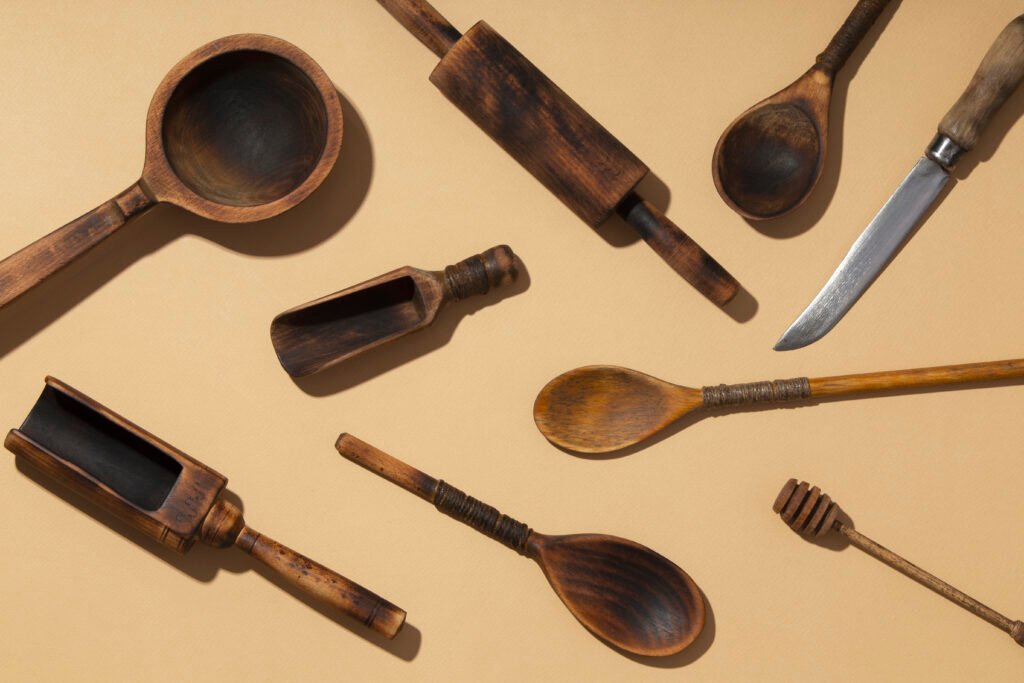
Features of Bamboo Kitchen Utensils
The Eco-Friendly Option:
One of the most sustainable materials on the market is bamboo, a grass that grows quickly. Bamboo may be harvested in a few years, unlike hardwood trees that can take decades to reach maturity. Bamboo is a highly renewable resource that grows quickly, which makes it a great option for eco-friendly cooking equipment.
Selecting cooking utensils made of bamboo can help mitigate the effects of deforestation and environmental deterioration. Bamboo also grows with less water requirements and doesn’t require any fertilizer or pesticides, which lessens its environmental impact. You may enjoy cooking and know that you’re helping the environment when you use bamboo kitchen tools.
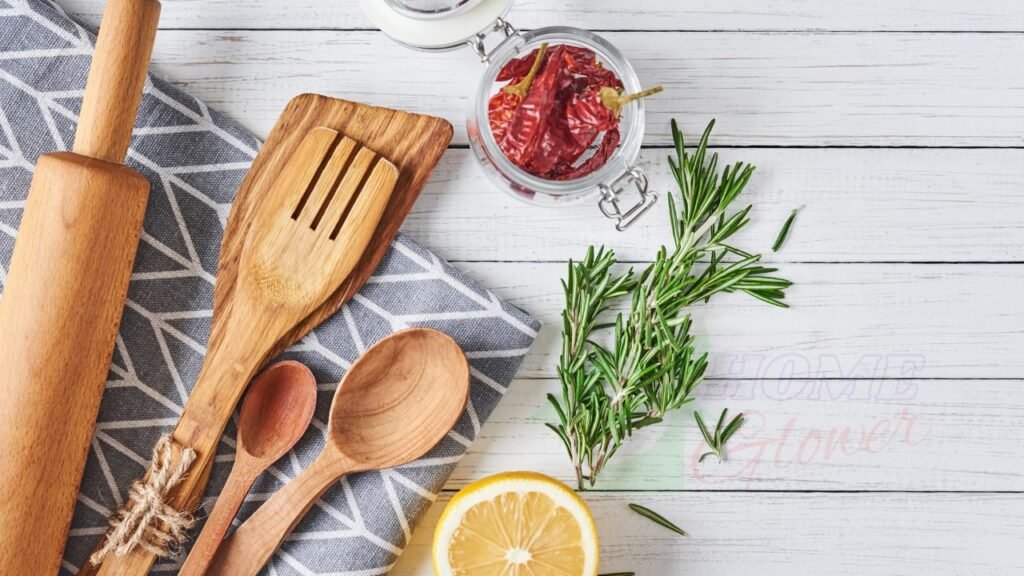
Strength and Durability:
Bamboo kitchen utensils are exceptionally robust and durable, even though they are lightweight. Because bamboo fibers are closely spaced, they can withstand high temperatures without breaking, splitting, or warping. Because of its resilience, your bamboo kitchenware will last you for many years even after putting up with the rigors of regular use.
In addition, bamboo kitchen tools are soft on cookware surfaces, shielding it from usual dents and dings from metal or plastic utensils. Bamboo utensils have the optimum balance of power and tenderness, making them excellent for all your culinary needs—whether you’re stirring, flipping, or serving.
Versatile and Stylish:
Bamboo cooking tools not only provide a functional purpose but also give a stylish touch to any kitchen. Bamboo kitchenware have a rustic charm that goes well with both classic and modern kitchen decor because of their warm tones and natural grain. Bamboo utensils are a visually pleasing accent to any kitchen, whether they are hanging on a rack or placed in a utensil holder.
Additionally, a range of sizes and forms are available for bamboo kitchen utensils, making them adaptable equipment for whatever kind of cooking you undertake. Everything from arranging salads to stirring soups can be done with a bamboo utensil. Additionally, a lot of bamboo cookware has ergonomic features for easy handling and a consistent enjoyable cooking experience.
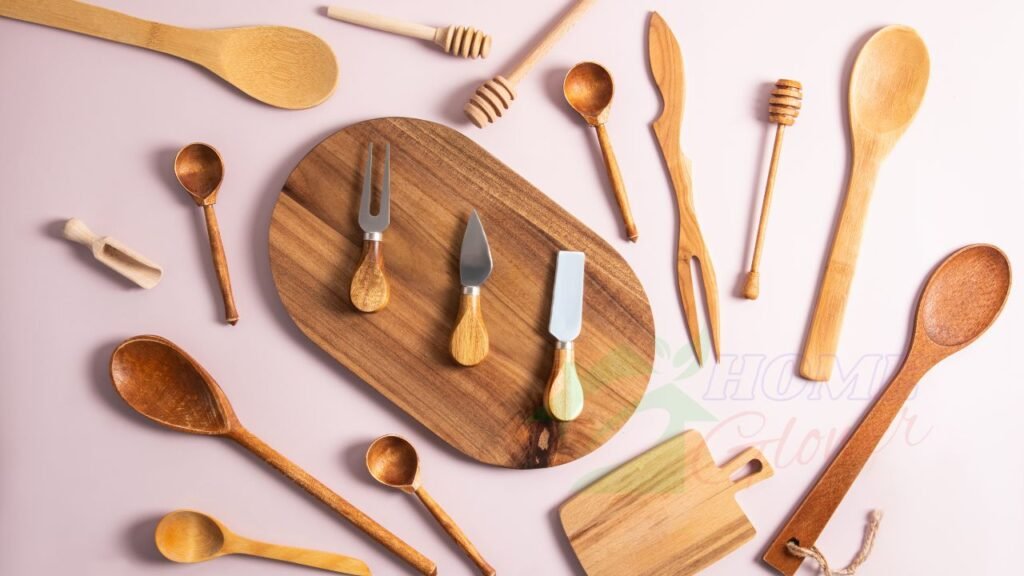
Easy to Clean and Maintenance:
Bamboo cooking utensils are naturally resistant to stains and odors, making them easier to clean and maintain than their metal or plastic counterparts. Your bamboo utensils will appear brand new after only a quick hand wash in a solution of mild soap and water. Bamboo cutlery shouldn’t be put in the dishwasher or left soaking for extended periods of time since this can harm the wood’s fibers.
Maintaining your bamboo cooking equipment properly is crucial to extending their lifespan. Apply mineral oil that is suitable for food on a regular basis to keep the bamboo from drying out and splitting. Your bamboo kitchenware will look great and be useful in the kitchen for many years to come with little maintenance.
Advantages of Bamboo Kitchen Utensils:
- Eco-Friendly:
Bamboo kitchen utensils are an environmentally sustainable option because it is a highly renewable material. Bamboo grows quickly and may be picked without causing deforestation, in contrast to hardwood trees.
- Durability:
Bamboo kitchen tools are surprisingly robust and durable for their low weight. Even with frequent usage, their resistance to splitting, cracking, and warping ensures longevity.
- Kind to Cookware:
The smooth surface of bamboo utensils shields it from typical damage and scratches brought on by metal or plastic utensils. They are therefore perfect for use with delicate cookware and non-stick pans.
- Stylish:
Bamboo kitchenware give a sense of rustic beauty to any kitchen with their warm tones and natural grain. They go well with a variety of kitchen decor types and are aesthetically pleasing.
- Versatility:
Bamboo kitchen tools are appropriate for a range of cooking chores due to their diverse forms and sizes. For all your culinary needs, from flipping and stirring to serving and tossing, a bamboo utensil is available.
- Heat Resistance:
Because bamboo utensils resist heat, you may use them in hot pots and pans without worrying about them melting or warping.
Bamboo utensils are easy to clean with light soap and water because they are naturally resistant to stains and odors. When it comes to upkeep, they need less than other materials.
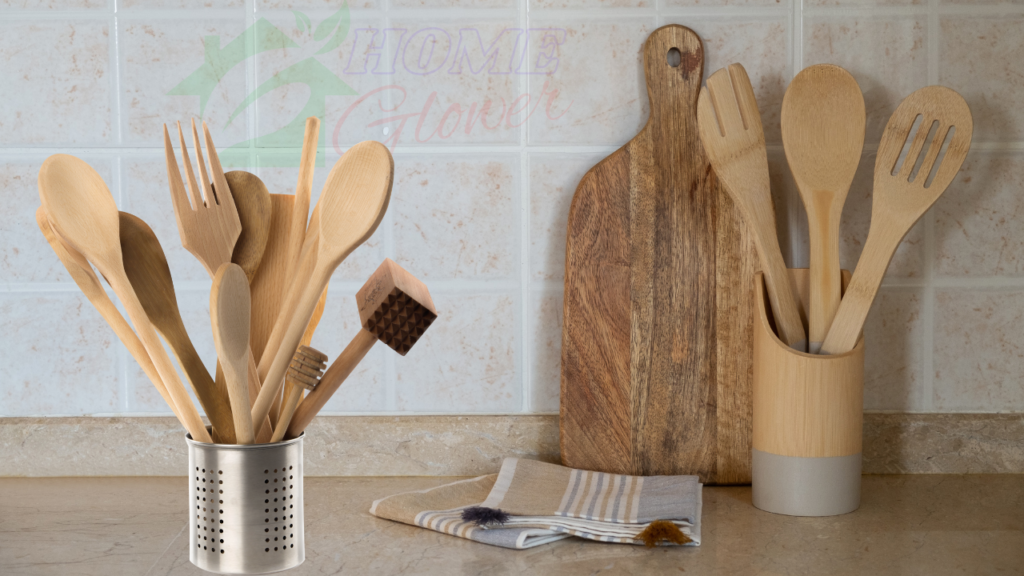
Disadvantages of Bamboo Kitchen Utensils
Bamboo is sensitive to moisture and can absorb water, which might cause swelling and possible damage if the material isn’t dried correctly after washing.
- Dishwasher Safe Not:
Bamboo cutlery should not be washed in the dishwasher because prolonged exposure to heat and water can damage and destroy the wood’s fibers.
- Restricted Variety:
Although bamboo utensils come in a range of sizes and forms, their selection could be more constrained than that of utensils made of other materials, including silicone or stainless steel.
- Potential Splintering:
If bamboo utensils are used excessively or are not properly cared for, they may eventually splinter or get rough edges. It’s critical to often check utensils for indications of wear and tear.
- Not Heat-Proof:
Although bamboo cookware may withstand some heat, prolonged exposure to high temperatures can cause it to char or discolor.
- Cost:
Kitchen utensils made of bamboo can cost more than those manufactured of other materials. However, the initial cost could be justified by the long-term durability and eco-friendly benefits.
Bamboo cooking utensils are a popular option for ecologically aware consumers searching for fashionable, long-lasting, and sustainable kitchen tools, despite these drawbacks. With proper care and maintenance, bamboo utensils can provide years of reliable service in the kitchen.
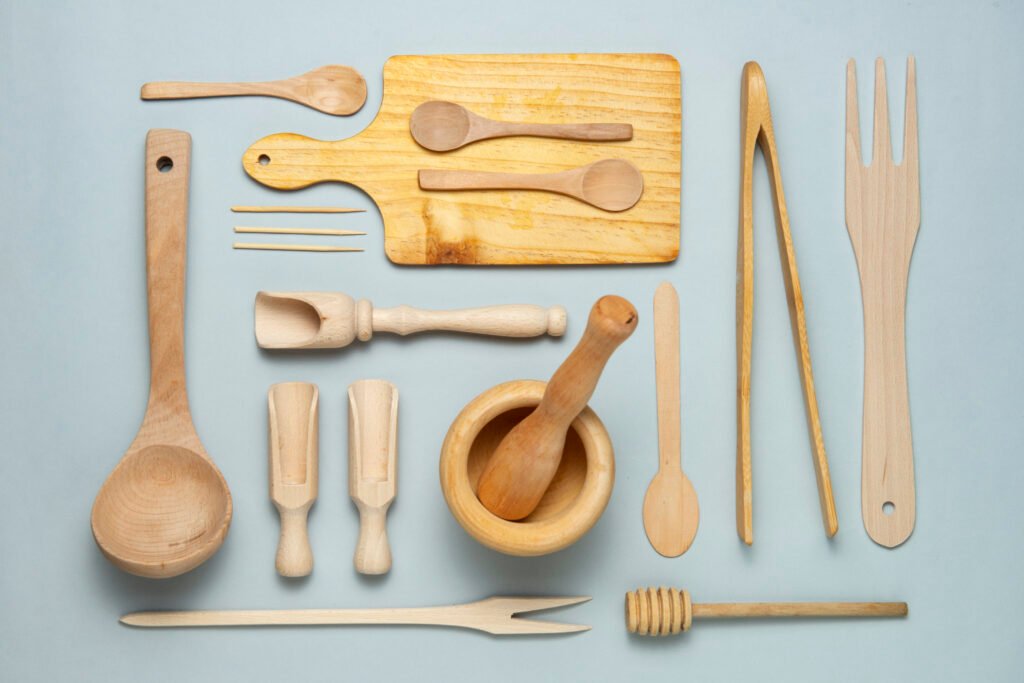
Care and maintenance of Bamboo kitchen utensils
For your bamboo cooking equipment to stay in great shape and last for many years, proper upkeep and care are necessary. The following advice will assist you in maintaining and caring for your bamboo cutlery:
- Dishwasher safe:
Bamboo cutlery should only be hand washed. After every usage, give them a hand wash in warm water with a little dish soap. Don’t soak them for too long, since too much moisture might make the bamboo swell and become weaker.
- Dry Completely:
To eliminate any remaining moisture, completely towel-dry your bamboo utensils after washing. Before storage, set them upright on a dishrack or utensil holder to allow them to air dry entirely to avoid water gathering and possibly causing damage.
- Avoid High Heat:
Although bamboo cookware is heat-resistant, it’s advisable to keep it out of the heat for extended periods of time. While cooking, don’t leave them in pots or pans, and keep them away from hot surfaces and open flames.
- Oil Frequently:
It’s critical to oil your utensils on a frequent basis to keep the bamboo from drying out and cracking. Wood can be nourished and kept looking beautiful with the use of food-grade mineral oil or bamboo oil. Wipe off any excess oil after applying a tiny quantity of oil to a clean cloth and rubbing it over the utensils’ surface.
- Store Properly:
Keep your bamboo cutlery out of direct sunlight and heat sources. Instead, keep it in a dry, well-ventilated space. Store them away from moist or humid areas, like those next to the dishwasher or under the sink, as this can encourage the growth of mold and other types of deterioration.
- Examine for Damage:
Continually check your bamboo cutlery for indications of deterioration, like cracks, splinters, or jagged edges. To avoid harm or food contamination, stop using the utensil right away if you see any damage, and replace it if needed.
- Use Caution:
Although bamboo cookware is resilient, misuse or incorrect handling might result in damage. The bamboo may chip or splinter if you use them to scrape or cut hard or sharp objects. When performing jobs that call for greater force or accuracy, use metal or silicone utensils.
You can increase the lifespan and maintain the best possible appearance and functionality of your bamboo kitchen utensils by adhering to these care and maintenance guidelines. Your bamboo kitchenware will remain dependable and environmentally beneficial for many years to come with the right maintenance.
Conclusion
In summary, bamboo cooking tools provide an excellent balance of robustness, eco-friendliness, style, and adaptability. Selecting bamboo will not only result in superior kitchenware but also have a beneficial effect on the environment. Bamboo kitchen utensils will improve your cooking experience regardless of your level of experience. Why then wait? Switch to bamboo kitchenware now to enjoy cooking in elegance and protect the environment for coming generations.
you may like know Door Curtain then click here.
FAQ
Are bamboo kitchen utensils safe to use?
It is safe to use bamboo kitchen utensils. They are devoid of dangerous substances and poisons that are frequently present in various metals and polymers. Bamboo is also naturally antibacterial, which means that it resists the growth of bacteria, increasing its safety when used in food preparation.
How durable are bamboo kitchen utensils?
Bamboo kitchen utensils are surprisingly robust and durable for their small weight. Even with frequent usage, their resistance to splitting, cracking, and warping ensures longevity. To avoid damage, though, you must handle them carefully.
Can I wash bamboo kitchen utensils in the dishwasher?
Dishwasher safety is not an option for bamboo cutlery. Over time, the bamboo in the dishwasher may weaken and degrade due to prolonged contact to heat and water. It is recommended to give them a good hand wash using warm water and a mild dish soap, followed by a thorough drying.
How do I maintain bamboo kitchen utensils?
Bamboo kitchen utensils require hand washing, thorough drying, and routine oiling with food-grade mineral oil or bamboo oil in order to stay in good condition. Keep them out of direct sunlight and heat sources, and check them frequently for signs of wear and tear. Store them in a dry, well-ventilated environment.
Are bamboo kitchen utensils eco-friendly?
Bamboo cookware is indeed environmentally friendly. Rapidly growing and very renewable, bamboo can be harvested without creating deforestation. Bamboo is also an environmentally friendly material for cooking utensils because it grows without the need for pesticides or fertilizers and needs very little water.
Can bamboo kitchen utensils be used with non-stick cookware?
It is safe to use bamboo cooking utensils with non-stick pans and sensitive cookware since they are soft on cookware surfaces. They are a great option for all kinds of cookware since they lessen the likelihood of scratches and other damage that is frequently brought on by using metal or plastic utensils.
Are bamboo kitchen utensils heat-resistant?
Although bamboo cookware can withstand some heat, it is advisable to keep it out of the heat for extended periods of time. Although they can tolerate the heat from common cooking operations, they shouldn’t be placed next to hot surfaces or open flames when cooking, nor can they be left in pots or pans.




